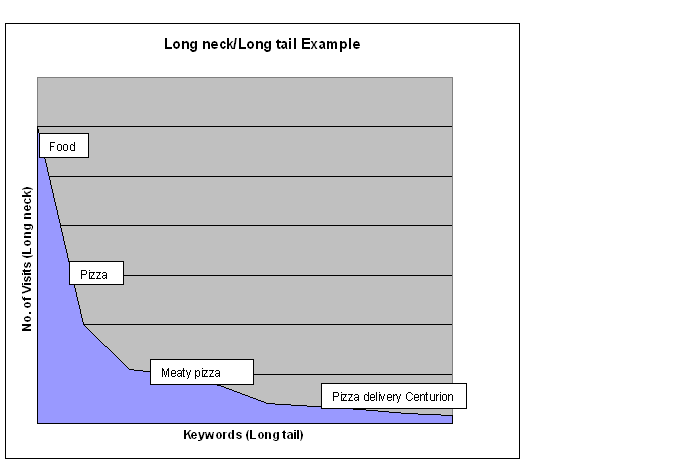Identifying the right keywords for search engine optimization is essential, so picking the most popular ones would be the obvious choice?
Long Neck: Long neck (or short tail) keywords, refers to keywords that are broader and therefore used more often. Most long neck phrases are one word in length. Long neck keywords, as indicated by the graph, are the most popular keywords and individually have the most visits. These keywords are however highly competitive, and demand more resources to be optimized effectively.
Long Tail: Long tail keywords, refers to keywords that are more specific, and therefore aimed at niche markets. Long tail keywords, as illustrated by the graph, are less popular, however they are less competitive. Long tail phrases are mostly longer than one word. Four word phrases have the highest conversion rate (Resulting in a sale). The obvious choice would be to optimize the most popular keywords, wouldn't it? However while the Long neck keywords individually get the most visits per keyword, overall the long tail as a whole gets the most visits.
For example (refer to graph): Lets say you are sitting in the office and it is approaching lunchtime. Suppose you were to google the word “food” you would find yourself searching in the long neck of search phrases. Now you want to narrow your search so you try “Pizza”, or even narrower “Meaty pizza”. At this stage you are approaching the long tail; a more specific search produces less results, but increases specificity. By searching the phrase “Pizza delivery Centurion” you are using long tail keywords, and most likely getting the result that you need- finally!
Reasons for Targeting Long Tail Keywords:
-You cater for a broader audience.
Surprisingly *70% of all searches are in fact long tail searches, by optimising for these keywords you are ultimately broadening your reach and increasing your chances of being found. *According to SEOmoz.
-Competition is less severe.
Less competition means it is easier to rank first for those phrases.
-Requires fewer resources.
The broader the search term the more difficult it becomes to achieve the top rank for it, which often means the only way you can even dream of featuring on the front page of the search is to run a PPC campaign, and of course the more popular the term the more expensive it will be to run. Time is also a huge factor to consider. The broader the search term the more time and energy will have to be put in to maintain that top page ranking if you wish to achieve it organically.
- Long tail keywords make for a flexible SEO practice.
If you focus on only a few broad keyphrases (which most businesses do) and all of a sudden your ranking drops, which can happen for a number of reasons, your business will suffer considerably. But with Longtail terms you don’t keep all your eggs in one basket, so to speak, which means you can easily tweak your SEO without losing everything.
- Users who search for long tail keywords are usually further up in the sales cycle.
Long tail phrases are specific in nature and occur once the user has a better understanding of what they want. For example: A user searching for food clearly has no clue what they’re in the mood for, where as if a user is searching for “Pizza delivery Centurion”, they are clearly at the point in the sales cycle where they are ready to make a purchase.

By targeting the long tail keywords you are also able to establish yourself within niche markets. Long tail leads also convert more visits into sales because the people know exactly what they are looking for. By doing proper keyword research you can identify exactly which keywords you should really be spending your time on. Additionally this allows you to optimize your website accurately.
Now of course, as with anything, you should be measuring your efforts. Have a look at your bounce rates and conversion rates, if users are leaving shortly after visiting certain long tail optimised pages then you’re clearly not providing them with the right content. The same with conversion rates, which are especially important when optimising long tail terms, because, at least in theory, the user should be higher up in the sales cycle. Remember, it’s great to have your content SEO optimised but if your efforts are not generating you business or sales leads you are ultimately wasting time and money.
Note: One of the best ways of targeting long tail keywords and phrases is through your company blog. Don't have a company blog? Check out Content Marketing 101: 12 Steps to Creating a Powerhouse Blog.
While long neck keywords might seem the most attractive, it is the long tail keywords with the most potential. Sometimes the most obvious choice is not the most attractive, but the one with the most opportunity.
Got any long tail advice , share it with me here or @JulianKarstel.
Julian Karstel is a Digital Marketing Consultant for Sound Idea Digital | @JulianKarstel|Julian@soundidea.co.za | Sound Idea Digital is a full service digital agency |www.soundidea.co.za
[Back]
blog comments powered by Disqus
